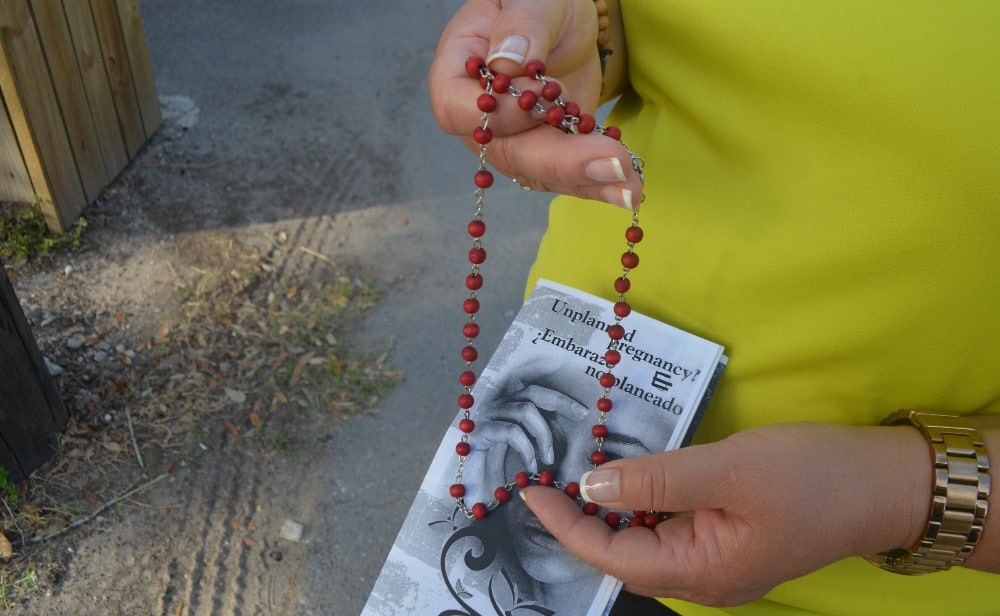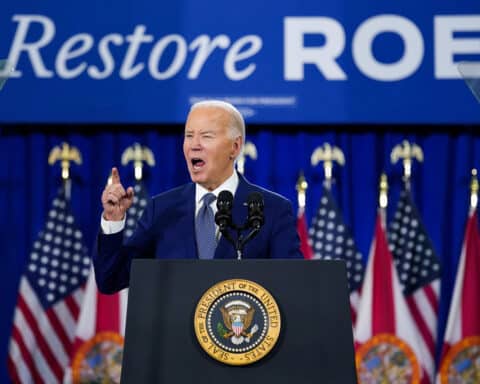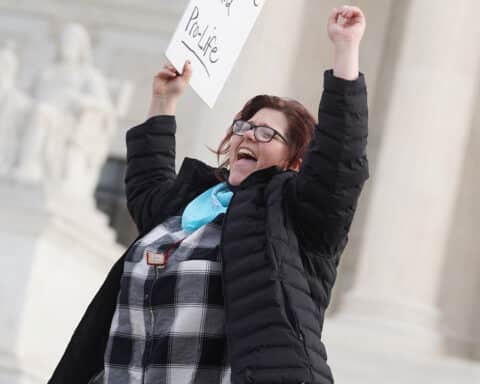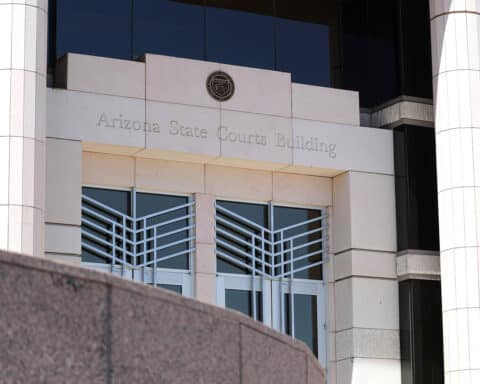With the Dobbs victory in hand, pro-life organizations in blue states where abortion services are either codified or being expanded are taking to the streets, literally.
Mary Rose Short, director of outreach for California Right to Life, prayed 15 decades of the Rosary on the morning of June 29 before turning to the job at hand — street counseling on the sidewalk outside FPA Women’s Health in Oxnard.
“I can’t change any woman’s mind, but I can tell them these are the options your living son or daughter are counting on you to consider,” she told Our Sunday Visitor in a phone interview with the sounds of traffic in the background. “Our pamphlets direct mothers to pregnancy and health centers,” where they can get help to overcome the obstacles they may believe offer no choice but abortion.
Pregnancy centers offer prenatal care and connections to other services for expectant mothers and moms and babies like child care, baby formula, housing, perhaps adoption and more.
The landmark 1973 Roe v. Wade decision was overturned on June 24 by the Supreme Court, ending constitutional protections for abortion that had been in place nearly 50 years.
Since then, people on both sides of the abortion issue have addressed the likelihood that women from red states that ban abortion will soon be traveling to California to procure an abortion.
The same fight is underway in blue states across the country from California to Massachusetts to Illinois and New York. Pro-life organizations confront the dilemma that the fruits of the victory in the Dobbs decision are not available to them or likely trimmed away while still in bloom.
A new conversation
Michael Kenney, president of Pro-Life Partners Foundation in Livonia, Michigan, told Our Sunday Visitor: “It is a challenge. … We need to be particularly sensitive. Sidewalk counselors in restricted states need to be aware some of those women (approaching abortion providers) were referred to another state.
“They will need to expand their conversation … make them aware of pregnancy resource centers … make them aware a pregnancy center there will help them. This is an opportunity to educate, to inspire mothers to reconsider to help remove them from the emergency situation they believe they are in.”
“Obviously the legislature in California is not searching for new legal restraints on abortion; our legislature is headed in the opposite direction,” Short said.
California is America’s most populous state and perhaps its most progressive. Gov. Gavin Newsom announced that California will be the leading sanctuary state for abortions in the country, and a slew of legislation have followed in support of his boast. Newsome already signed a bill that protects those in California from civil liability for providing, aiding or receiving abortion care in the state.
On the other hand, Missouri, Texas and other states that already ban abortion are adopting laws that empower private citizens to civilly sue residents who have an abortion out of state, as well as their providers and anyone who assists them in seeking an abortion. Texas has enacted a six-week ban on abortion with a private right of action enabling individuals to sue abortion providers and others.
Nevertheless, Myrna Maloney Flynn of Massachusetts Citizens Right to Life said the Dobbs decision was met with “excitement, disbelief, thanksgiving and gratitude for our members who worked for 50 years for this.”
Project Love
In Chicago, Amy Gehrke, executive director of Illinois Right to Life, said the pro-life group “is overjoyed (by Dobbs). This is a time for celebration because millions of babies will be saved.”
However, Illinois had loosened regulations on abortion sites before Dobbs and is looking to expand its availability to accommodate an anticipated influx of women from the 26 states that ban or restrict abortion, plus another four states that are poised to enact bans, including neighboring Indiana and nearby Nebraska, or further restrictions on abortion, like Missouri.
“Planned Parenthood estimates an additional 20,000 to 30,000 women could come to our state each year to seek an abortion,” Gehrke said.
The Chicago Tribune reported that about 10,000 women from outside Illinois received abortions there in 2020, according to the Illinois Department of Public Health.
“The double-edged sword of the ruling is that even more women will be coming to our state for abortions,” Gehrke said. “In Illinois abortion laws are radical, so much so that the abortion industry regulates itself.”
Gehrke says the fight against the state’s abortion laws will be fueled by “educating the people of Illinois how extreme the abortion laws are, by educating people how many of our legislators care more about Planned Parenthood and the rest of the abortion industry than they do about them.”
Another front will be “providing resources to Project Love, which addresses the financial issues expectant mothers face, and to the pregnancy resource centers to expand the help they provide,” she said.
Project Love is a grant program of Illinois Right to Life that supports women in unplanned or crisis pregnancy situations. Project Love was “founded in 1996 by the late Mary Bliss out of her love and concern for pregnant women in difficult situations,” according to the website.
Since its inception, Project Love has given over $500,000 in grants to support pregnant women and their families. Project Love’s mission is to support pregnant women and new mothers in a financial crisis by providing grants for rent, utility bills or other necessities, Gehrke said.
But how do pro-life organizations inform women traveling from out of state in search of abortion about those alternatives?
“Our goal is to put up as many billboards as we can on the highways coming into Illinois,” Gehrke said. “We will provide digital advertising through the Project Love website, and we will provide sidewalk counseling where we find a lot of interest. There already are a lot of out-of-state license plates in the parking lots at Planned Parenthood and other abortion industry sites.”
Abortion pill rises
Dr. Mark Rollo of Fitchburg, Massachusetts, joined the fight against Roe v. Wade from its beginning. The family practitioner, a board member and former president of Massachusetts Citizens Right to Life, worries about the wave of women seeking so-called morning-after abortion pills.
“Medical abortion by pill is increasingly coming and is up to about 50% of abortions,” Rollo told Our Sunday Visitor. “It will likely go up with the overturning of Roe. Women will go across state lines to get mifepristone. FDA had a protocol where you had to be in person for the pill to be prescribed. You used to have to verify by a physician’s exam to date the pregnancy. Without that exam, you can miss an ectopic pregnancy, and there was an RH test to determine if the mother or child were opposite RH negative or RH positive. If you have this undetected, it would doom future pregnancy with miscarriage or the child could be born with heart failure.”
The manufacturers of contraception pills report skyrocketing sales, beginning with the leak of the Dobbs decision in May.
Lori Kehoe, executive director of the New York State Right to Life Committee, is encouraged by the response of some pro-choice friends who have joined her homeschooling program when they see pro-lifers in a non-argumentative setting.
“We should not let this opportunity escape to educate about how extreme Roe is and what it wrought,” Kehoe told Our Sunday Visitor. “A lot of friends are pro-abortion, and few of them ever knew what Roe is. When they spend time with pro life people and learn about Roe, many of them as Democrats and pro-choice are not anymore.”
Joseph R. LaPlante writes from Rhode Island.





